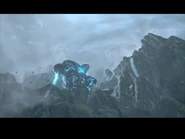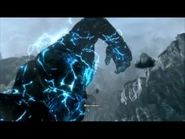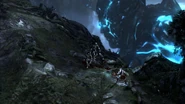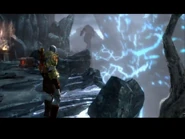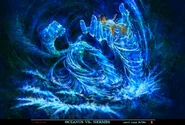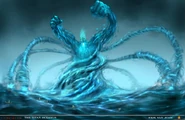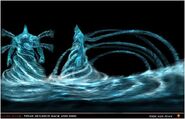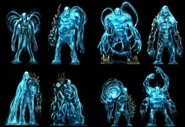
This article contains lore based on real-life sources of the Greek mythology as introduced from the God of War Greek era.
Oceanus ( Ὠκεανός), known as the great river girdling the world, was a God of War II character ultimately cut from its final version, before appearing in God of War III during the siege of Mount Olympus. He was ultimately killed by Hades when Kratos attempted to climb up the mountain to reach Zeus.
Greek Mythology
In the Greek mythology, Oceanus was one of the Titans. He was the husband and brother of Tethys and is well known in mythology as the great river that girdles the world. Not much is known about his role in the Great War. It is said that he did not participate in the war and left his Titan brothers. Also, Oceanus was also against the decision to overthrow Uranus. Thus, he avoided being imprisoned in Tartarus.
His only appearance of note in the Greek Myths is when he stirs up the ocean to test the hero Hercules on his way to fetch the Cattle of Geryon. Hercules managed to frighten Oceanus into calming the sea by threatening him with his bow. Also, it is said that Oceanus and Tethys raised the goddess Hera after Cronos threw her up. Oceanus and Tethys, are the parents of the 3.000 Oceanids (goddesses of salt water) and the 3.000 Potamids (gods of the sweet water).
In the God of War Series
Early life
Not much is known about Oceanus early life, other than him being one of the elder Titan sons of Gaia and Ouranos. He ruled the infinite waters within the young cosmos, even before his brother Cronos ascended and usurped their fathers high throne.
He had thousends of children with his wife and queen Tethys, all of them aquatic deities called Oceanids, such as Metis and Amphitrite, the later wives of Zeus and Poseidon. His many children helped him solidify his rule against older sea deities from the previous generation.
When the children of Cronos, the mighty ruler of the world escaped from his belly and declared war on the Titans, Oceanus stood by his brothers and mother Gaia against the usurping Gods. Poseidon, the second son of Cronos started to lay claim and challenge the ancient and vast Oceanus over supremacy of his endless domain. By the last stage of the Great War, the mighty Poseidon had defeated Oceanus and his vast offspring, summoning all the water in the world to do so and becoming the new Lord of the Oceans.
It is possible that Oceanus, though deposed was able to evade imprisonment in Tartarus like his mother Gaia, as he was able to rise up during the events of God of War II and roam his domain, much like Gaia did herself.
God of War II
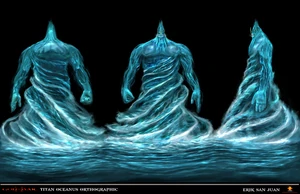
Oceanus was originally intended to be in God of War II, portrayed as a massive and entirely water-based creature, quite different from his much more solid brethren, but was cut from the game.
Oceanus makes an indirect appearance in the God of War II novelization, where Poseidon mentions he is rising again and defying his rule over the oceans the closer Kratos gets to reaching the Sisters of Fate. Zeus, in response to this, claims that Oceanus was the least of the Titans, to which Poseidon stated Oceanus and his children were fierce enough to require the water of all the seas and lakes in the world to beat.
God of War III
He appears in God of War III as the Titan of Water and Lightning. He possesses the same physical body of the other Titans, with an electric current running though most of it that does massive damage to the surrounding mountains. He is seen being pulled off Mount Olympus by Hades who then jumps down after him, though some believe that Oceanus in fact pulled Hades down with him. Many assumed that he died during that fall.
His final fate is unknown, but as Gaia is the (presumed) final Titan by the end of the game (with the exception of Atlas, Rhea, and maybe Typhon) it is assumed he died during the climb up on Olympus. His weapons were water and his serpent.
Trivia
- Though the concept of Oceanus as a giant water titan would appear abandoned, the design was recycled for Poseidon, who bore a very similar watery form at the beginning of God of War III.
- The blue electrical currents from Oceanus are also very similar to Poseidon's ones, which can also be seen in God of War's magic Poseidon's Rage. Both seem to represent the power of the seas.
- Oceanus and Perses have a similar look, being both Titans with a black skin. The only differences are the lines over their body; Oceanus' are blue and Perses' are red, the electricity around Oceanus which Perses lacks and the volcano on the latter's back.
- Since he was able to rise up and challenge for supremacy over the seas during the God of War II Novel, it is most likely that he never was imprisoned in Tartarus. Maybe his connection/embodiment of his domain is much closer to his primordial parents and aunts/uncles just like it is in mythology, therefore allowing him to evade Tartarus like his mother Gaia does.
- During the Siege on Olympus during the beginning of God of War III, the Hippocampi dont seem to bother him, instead it required Hades himself to cast him off Mount Olympus.
- Zeus calls him the least of the Titans when discussing his return with Poseidon, but that may have been intentional on Zeus' part to belittle Poseidon and his domain.
- In David Jaffe's idea of God of War III, Oceanus, in his water form, should kill Hermes.
Gallery
| |||||||||||||||||||||||||||||
| |||||||||||||||||||||||||||||
| |||||||||||||||||||||||||||||
| |||||||||||||||||||||||||||||
